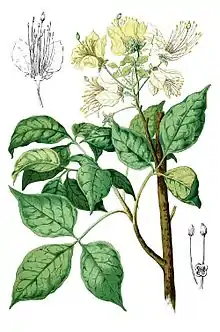Crateva
Crateva is a genus of flowering plants in the caper family, Capparaceae.[1] It includes 21 species which range through the tropical regions of the world, including the tropical Americas (Mexico to northeastern Argentina), sub-Saharan Africa, the Indian subcontinent, Indochina, southern China, Japan, Malesia, Papuasia, Queensland, and the South Pacific.[2]
| Crateva | |
|---|---|
 | |
| Crateva religiosa | |
| Scientific classification | |
| Kingdom: | Plantae |
| Clade: | Tracheophytes |
| Clade: | Angiosperms |
| Clade: | Eudicots |
| Clade: | Rosids |
| Order: | Brassicales |
| Family: | Capparaceae |
| Genus: | Crateva L. (1753)[1] |
| Synonyms[2] | |
| |
Species
Accepted species include:[2][3]
- Crateva adansonii DC.
- Crateva brevipetala (Exell) Christenh. & Byng
- Crateva eminens (Hook.f.) Christenh. & Byng
- Crateva excelsa Bojer
- Crateva falcata (Lour.) DC.
- Crateva formosensis (Jacobs) B.S.Sun
- Crateva greveana Baill.
- Crateva humblotii (Baill.) Hadj-Moust.
- Crateva hygrophila Kurz
- Crateva kirkii (Oliv.) Christenh. & Byng
- Crateva magna (Lour.) DC.
- Crateva monticola (Gilg & Gilg-Ben.) Christenh. & Byng
- Crateva obovata Vahl
- Crateva palmeri Rose
- Crateva religiosa G.Forst.
- Crateva simplicifolia J.S.Mill.
- Crateva suaresensis Baill.
- Crateva tapia L.[4]
- Crateva unilocularis Buch.-Ham.
- Crateva urbaniana R.Rankin
- Crateva yarinacochaensis Cornejo & Iltis
Formerly placed here
- Aegiceras corniculatum (L.) Blanco (as C. corniculatum (L.) L.)
- Aegle marmelos (L.) Corrêa (as C. marmelos L.)[3]
References
- "Genus: Crateva L." Germplasm Resources Information Network. United States Department of Agriculture. 2006-03-31. Archived from the original on 2009-01-14. Retrieved 2011-02-01.
- Crateva L. Plants of the World Online. Retrieved 1 October 2023.
- "GRIN Species Records of Crateva". Germplasm Resources Information Network. United States Department of Agriculture. Archived from the original on 2009-01-20. Retrieved 2011-02-01.
- Condit, R. (2021). "Crateva tapia". IUCN Red List of Threatened Species. 2021: e.T58933301A176099312. doi:10.2305/IUCN.UK.2021-1.RLTS.T58933301A176099312.en. Retrieved 18 November 2021.
This article is issued from Wikipedia. The text is licensed under Creative Commons - Attribution - Sharealike. Additional terms may apply for the media files.